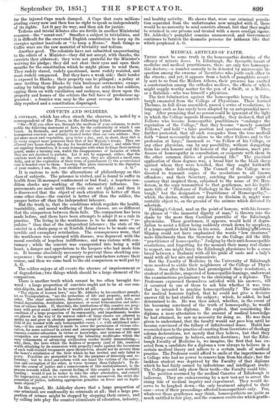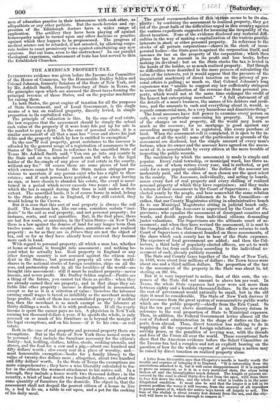MEDICAL ARTICLES OF FAITH.
THERE must be some truth in the homceopathie doctrine of the efficacy of minute doses. In Edinburgh, the favourite haunt of medicine and medical practitioners, there are only five homceopa- thic doctors,—a number scarcely to be detected by microscopic in- spection among the swarms of licentiates who jostle each other in the streets; and yet, it appears from a batch of pamphlets recent- ly sent to us from the Modern Athens, their presence has excited a consternation among the orthodox medicos, the effects of which might supply worthy matter for the pen of a Swift, or a Moliere, or a Rabelais— who was himself a physician.
The first fulmination against the homceopathic heresy in Edin-
burgh emanated from the College of Physicians. These learned Thebans, in full divan assembled, passed a series of resolutions, in language such as has rarely been adopted by an anteprandial meet- ing. After premising that no person could be ignorant of the light in which the College regards Homoeopathy, they declared, that all Fellows who become hommopatbie practitioners "endanger the- reputation of the College," that they become "merely nominal Fellows," and hold "a false position and spurious credit." They further protested, that all such renegades from the true medical faith "must necessarily be aliens to the other Fellows and to the profession at large," inasmuch as "no Fellow of his College, or any other physician, can by any possibility, without derogating from his own honour and the honour of the profession, meet pro-
fessors of homoeopathy in consultation, or cooperate w,ith them in the other common duties of professional life." The practical application of these dogmas was, a broad hint to the black sheep. against whom they were levelled, that the ought 'forthwith to resign their fellowships. The Council ot the College were directed to transmit copies of the resolutions to all known offenders ; and their Secretary, catching the peculiar spirit of ! courtesy that inspired them, subjoined to the name of Dr. Hen- ' derson, in the copy transmitted to that gentleman, not his legiti-
mate title of "Professor of Pathology in the University of in- burgh," but the designation "Practitioner of Homccopathy,"— which the doctor, without any desire to disclaim it, might war- ' rantably object to, on the ground of the animus which dictated its ! selection. I Fielding's Colonel, mad on the point of honour, with hissfavour-
ite phrase of "the immortal dignity of man," is thrown into the shade by the more than Castilian punctilio of the' Edinburgh physicians. These gentlemen, it appears, would hold it degra- dation to assist a fellow being suddenly struck down by apoplexy, if a homceopathist held him in his arms. And Fielding'VMistress Slipslop could not have emphasized the words "low creatures" more felicitously than the Secretary to the College did the title "practitioner of homoeopathy." Judging by their anti-homceopathic resolutions, and forgetting for the moment their many real claims to respect, one might fancy the Edinburgh physicians to be a cross breed between a Brahmin with all his pride of caste and a lady's maid with all her airs and minauderie.
But the Faculty of Medicine in the University of Edinburgh
were resolved to outdo their neighbours of the College of Physi- cians. Soon after the latter had promulgated their resolutions, a student of medicine, suspected of homoeopathic leanings, underwent the examinations preliminary to the obtaining of a diploma. The- Professors expressed themselves satisfied with his answers, till it occurred to one of them to ask him whether it was true that he intended to practise homceopathically ? The candidate for medical honours replied, that he could not give a decisive. answer till he had studied the subject ; which, he added, he had determined to do. He was then asked, whether, in the event of his becoming convinced of the truth of homceopathy, he would burn or return his diploma. He replied, that considering the diploma a mere attestation to the amount of medical knowledge he had attained, he saw no necessity for doing so. 'He was then given to understand, that the faculty would not pass him until he became convinced of the fallacy of infinitesimal doses. Habit has- reconciled men to the practice of exacting from licentiates of theology solemn declarations, not merely that they believe, but -that they will always continue to believe, certain doctrines ; but the Edin- burgh Faculty of Medicine is, we imagine, the first that has ex- acted from a candidate for a diploma a vow always to believe in a certain medical theory and adhere to a certain mode of medical practice. The Professor could afford to smile at the impertinence of a College who had no power to remove him from his chair ; but the luckless -student -was deprived by the Faculty of that diploma vihiehhe had fairly earned 'by industrious and intelligent study. The College could only show their teeth—the Faculty could bite.
The position assumed by the medical Canutes of Edinburgh is ludicrous. They are endeavouring by a new test-act to arrest the- rising tide of medical inquiry and experiment. They would de- serve to be laughed down—the only treatment adapted to their ease—even if their proceedings affected homeopathists only. For, Whatever those gentlemen may think, homceopathists are quite as much entitled to fair play, and the common courtesies which gentle-
men of education practise in their intercourse with each other, as allopathists or any other pathists. But the mock-heroics and ops pression of the Edinburgh doctors have a wider NAVA cs4 application. The artillery they have been playing off against homceopathy might be turned upon any other doctrine or practice against which they happen to be prepossessed. The. progress of medical science can be retarded, if not arrested, by allowing corpo- rate bodies to exact promissory vows against entertaining any new opinions. But oui bono, even to the obstructers P In our parallel theological experience, enforcement of tests has best served to thin the Established Churches.



























 Previous page
Previous page